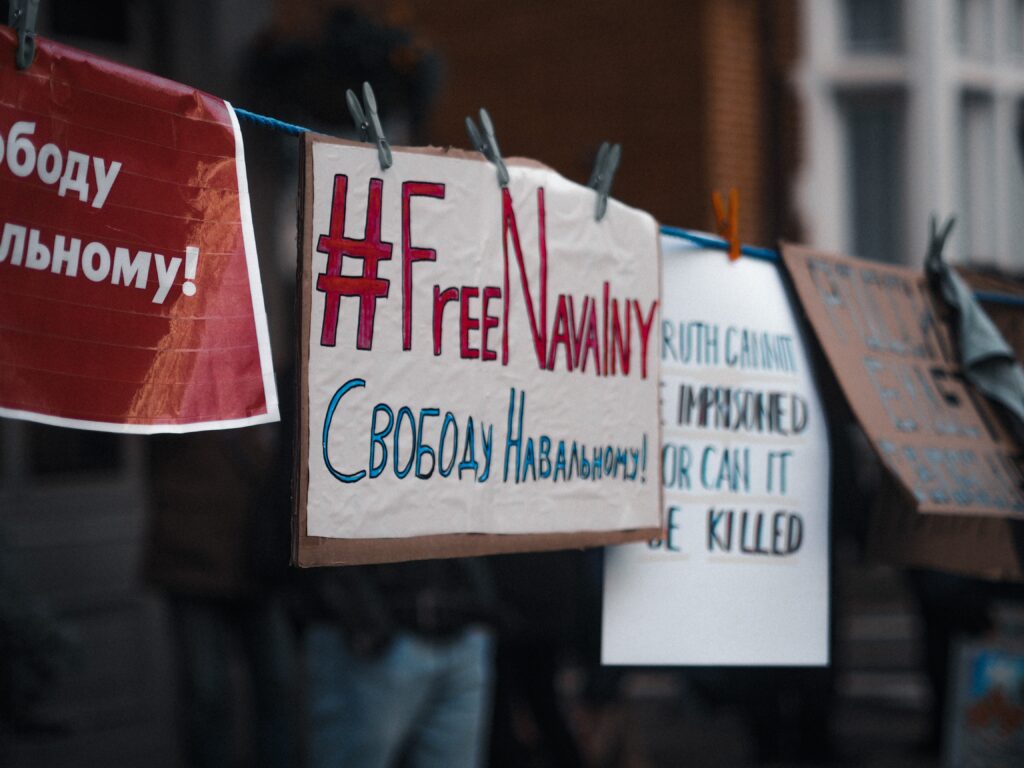On Tuesday morning, popular Russian opposition figure Alexei Navalny was sentenced to two years and eight months in prison. Navalny was seen laughing as the verdict was announced, which culminated a months-long ordeal that has recently erupted in nationwide protests in Russia.
Navalny is an outspoken critic of the Vladimir Putin government, and just a few weeks ago, returned to Russia after a botched poisoning attempt on his life by Russian intelligence services. Navalny returned to Moscow on January 15 from his five-month recovery in Germany. Navalny and his wife, Yulia, boarded a flight on Pobeda Airlines, which means ‘Victory’ in Russian, along with international media reporters. The world watched Navalny’s return to Russia closely, anticipating an inevitable response from the government that surely would seek to arrest him for this bold move. At the last minute, the flight was rerouted and Navalny was met with security forces upon landing and detained before the passport control booth.
In the two weeks since his detention, as he awaited sentencing, Russia has seen a swell of people protesting in the streets in support of Navalny, the likes of which has not been seen in decades. As a result of these protests, over 5,000 demonstrators have been detained in the crackdown response from Russian authorities.
Navalny has been a consistent leader of political opposition to Putin and has garnered support from across the political spectrum under a political platform of anti-corruption and a personal platform of energized charisma. He founded the Party of Progress in 2012, which has championed increasingly pro-worker policies such as an increase in the pensions and salaries of state employees. In March 2020, Navalny even claimed to support candidate Bernie Sanders in the United States Democratic primary.
He is also a known ethnic Russian nationalist and has participated in far-right marches against “illegal immigration” and launched a campagin against “feeding the Caucausus.” The latter was targeted against poor, ethnic minorities in Chechnya and the Caucuses whose “corrupt” and “ineffective” governments are the recipients of federal subsidies. Navalny said at one of these marches: “Those of us who are here, we know and believe that there are also ‘normal’ people in the Caucasus — not only those freaks who are in power. We know that there are girls there whose life’s ambition is not about being wrapped up in a burqa and having 25 children, but about living a decent life like humans.” He also supported Russia’s 2008 war against Georgia and used derogatory terms for Georgians in his blog, which he has since apologized for but remains firm in other positions he took at that time. Navalny is also in support of deporting illegal immigrants and has called for an introduction of a visa regime for the countries of Central Asia.
It’s important to note that Western observers and media outlets seem to downplay Navalny’s nationalistic beliefs and chameleon political nature in the hopes of finding a champion for liberal democracy and human rights in Moscow. But the broader picture of his nationalist ideology should be acknowledged and further explored.
Regardless, Navalny has managed to unite thousands of discontent Russians to mobilize behind him. In a stunning and effective tactical move, Navalny’s camp released a two-hour long documentary detailing a secret mansion dubbed “Putin’s Palace” built on the Black Sea. While to many, the Palace has been identified since 2010, this video in its timely release — the day of Navalny’s arrest — has sparked new outrage among the working class and Navalny’s supporters. The documentary goes so far as to peek inside Putin’s bedroom and sheds light on everything up to the hookah lounge with a built-in strip pole. Particularly, amid a national economic downturn, Putin’s extravagance and little regard for Russia’s working class has been a glaring offense to many. For young people, there is a sense of economic desperation as a result of lower wages and a stagnating value of the Russian ruble, the effects of decreased foreign investments, low oil prices, and sanctions from the West since Russia’s condemned annexation of Crimea. This frustration has boiled over into the streets, with the largest protests seeing several thousand people march in Moscow.
The Kremlin warned against protesting, citing the coronavirus pandemic. Officials threatened individuals breaking health guidelines would be detained. Russian law dictates that local authorities must be notified of public gathering and protests before 10 days of assembling. From the Pacific Bay, to the Ural Mountains, to even Yakutsk, the world’s coldest city, protests erupted. At around noon in each of Russia’s ten timezones, people poured into the streets in support of Navalny. In Moscow, people pelted police with snowballs. In St. Petersburg, crowds clapped back at riot police banging on their shields in attempted intimidation. Chants such as, “Putin is a thief,” and, “Russia will be free!” were heard across the country.In Moscow, crowds marched to the jail where Navalny is being held, chanting, “All for one and one for all!”
Footage from the protests also show the intensity of the violence in response by security forces, reminiscent of the ongoing Belarusian government and U.S. crackdown against the Black Lives Matter movement. Journalists and reporters have been beaten, unarmed and unresisting protesters have been bludgeoned and even carried off in vans. There are increasing reports of the use of stun guns by police. Navalny’s wife, Yulia was also detained at a protest and has since been released. On January 31, Russia saw a new record for the highest number of police out in the streets and people arrested in Moscow. Putin and government officials have claimed that the protests are Western-backed insurrection, specifically from the United States as a “strategy to contain Russia.”
The international community also responded to the protests. Swedish Foreign Minister Ann Linde, who currently chairs the Organization for Security and Cooperation in Europe (OSCE), condemned “the excessive use of force by authorities and mass detention of peaceful protesters and journalists” and urged Russia “to release all those unjustly detained, including Navalny.” The European Court of Human Rights announced Monday, before Navalny’s trial, that a complaint filed against Russia concerning Navalny’s poisoning would be considered and on Tuesday deemed that his sentencing was politically motivated.
The United States pressed for Navalny to be released and criticized the tactics used by state police. “The U.S. condemns the persistent use of harsh tactics against peaceful protesters and journalists by Russian authorities for a second week straight,” U.S. Secretary of State Antony Blinken wrote on Twitter before Navalny’s trial.
NGOs have also spoken out. In a statement on the protests, Natalia Zviagina, Amnesty International’s Moscow office head, said, “the Kremlin is waging a war on the human rights of people in Russia, stifling protesters’ calls for freedom and change.” Amnesty also reported that Moscow detention facilities have reached maximum capacity and have run out of space.
Navalny and his supporters have urged President Joe Biden to place new sanctions on eight individuals with close ties to Putin. These are eight on the ‘priority shortlist’ out of total 35, seven of whom already face U.S. sanctions. The letter reads: “the West must sanction the decision makers who have made it national policy to rig elections, steal from the budget, and poison. It must also sanction the people who hold their money.”
Now that Navalny’s trial has concluded, there is no doubt that additional protests by his supporters will erupt throughout Russia. It is uncertain how hard Putin will crackdown on this incoming wave of dissent. State violence will likely intensify as a result of increased discontent from the masses.
“Hundreds of thousands cannot be locked up,” Navalny said during the hearing before his sentencing. “More and more people will recognize this. And when they recognize this — and that moment will come — all of this will fall apart, because you cannot lock up the whole country.”







